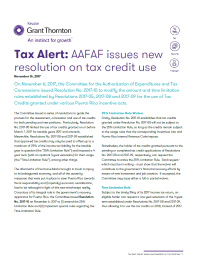-
Financial statements audits
Financial statement audits
-
Compliance audits
Compliance audits
-
Compilations and reviews
Compilations and audit
-
Agreed-upon procedures
Agreed-upon procedures
-
Corporate and business tax
Our trusted teams can prepare corporate tax files and ruling requests, support you with deferrals, accounting procedures and legitimate tax benefits.
-
International tax
Our teams have in-depth knowledge of the relationship between domestic and international tax laws.
-
Tax compliance
Business Tax
-
Individual taxes
Individual taxes
-
Estate and succession planning
Estate and succession planning
-
Global mobility services
Through our global organisation of member firms, we support both companies and individuals, providing insightful solutions to minimise the tax burden for both parties.
-
Sales and use tax and indirect taxes
SUT/ VAT & indirect taxes
-
Tax incentives program
Tax incentives program
-
Transfer Pricing Study
The laws surrounding transfer pricing are becoming ever more complex, as tax affairs of multinational companies are facing scrutiny from media, regulators and the public
-
Business consulting
Our business consulting services can help you improve your operational performance and productivity, adding value throughout your growth life cycle.
-
Forensic and investigative services
At Grant Thornton, we have a wealth of knowledge in forensic services and can support you with issues such as dispute resolution, fraud and insurance claims.
-
Fraud and investigations
The commercial landscape is changing fast. An ever more regulated environment means organizations today must adopt stringent governance and compliance processes. As business has become global, organizations need to adapt to deal with multi-jurisdictional investigations, litigation, and dispute resolution, address the threat of cyber-attack and at the same time protect the organization’s value.
-
Dispute resolutions
Our independent experts are experienced in advising on civil and criminal matters involving contract breaches, partnership disputes, auditor negligence, shareholder disputes and company valuations, disputes for corporates, the public sector and individuals. We act in all forms of dispute resolution, including litigation, arbitration, and mediation.
-
Business risk services
We can help you identify, understand and manage potential risks to safeguard your business and comply with regulatory requirements.
-
Internal audit
We work with our clients to assess their corporate level risk, identify areas of greatest risk and develop appropriate work plans and audit programs to mitigate these risks.
-
Service organization reports
As a service organization, you know how important it is to produce a report for your customers and their auditors that instills confidence and enhances their trust in your services. Grant Thornton Advisory professionals can help you determine which report(s) will satisfy your customers’ needs and provide relevant information to your customers and customers’ auditors that will be a business benefit to you.
-
Transaction advisory services
Transactions are significant events in the life of a business – a successful deal that can have a lasting impact on the future shape of the organizations involved. Because the stakes are high for both buyers and sellers, experience, determination and pragmatism are required to bring deals safely through to conclusion.
-
Mergers and acquisitions
Globalization and company growth ambitions are driving an increase in M&A activity worldwide as businesses look to establish a footprint in countries beyond their own. Even within their own regions, many businesses feel the pressure to acquire in order to establish a strategic presence in new markets, such as those being created by rapid technological innovation.
-
Valuations
We can support you throughout the transaction process – helping achieve the best possible outcome at the point of the transaction and in the longer term.
-
Recovery and reorganization
We provide a wide range of services to recovery and reorganisation professionals, companies and their stakeholders.
On November 6, 2017, the Committee for the Authorization of Expenditures and Tax Concessions issued Resolution No. 2017-10 to modify the amount and time limitation rules established by Resolutions 2017-05, 2017-08 and 2017-09 for the use of Tax Credits granted under various Puerto Rico incentive acts.
The Committee issued a series of resolutions to guide the process for the assessment, concession and use of tax credits for both pending and new petitions. Particularly, Resolution No. 2017-05 limited the use of tax credits granted on or before March 7, 2017 for taxable years 2017 and onwards. Meanwhile, Resolutions No. 2017-08 and 2017-09 established that approved tax credits may only be used to offset up to a maximum of 25% of the income tax liability for the taxable year in question (the “25% Limitation Rule”) and imposed a 4-year term (with an optional 3-year extension) for their usage (the “Time Limitation Rule”), among other things.
The aftermaths of Hurricane María brought in insult to injury to the island beleaguered economy, and although austerity measures were put in place to steer Puerto Rico towards fiscal responsibility and (hopefully) economic revitalization, these had to be rethought in light of this new wind-swept reality. Conscious of its integral role in the government’s recovery apparatus for Puerto Rico, the Committee issued Resolution No. 2017-10 on November 6, 2017 to (i) amend the 25% Limitation Rule and (ii) implement special rules regarding the Time Limitation Rule.
25% Limitation Rule Waiver
Firstly, Resolution No. 2017-10 establishes that tax credits granted under Resolution No. 2017-08 will not be subject to the 25% Limitation Rule, so long as the credits remain subject to the usage rules that the corresponding Incentives Law and Puerto Rico Internal Revenue Code impose.
Nonetheless, the holder of tax credits granted pursuant to the pending or completed tax credit applications of Resolutions No. 2017-08 and 2017-09, respectively, can request the Committee to waive the 25% Limitation Rule. Said request – which must be in writing – must show that the waiver will contribute to the government’s financial recovery efforts by means of new investment and job creation. If accepted, the Committee may issue either a full or partial waiver.
Time Limitation Rule
Subject to the timely filing of its 2017 income tax return, an eligible holder can request a one-year extension of the 4-year term established under Resolutions No. 2017-08 and 2017-09, thus allowing it to use the tax credits on 2018, instead of 2017.
An eligible holder is defined as “any holder of a granted credit available for use in tax year 2017, which experienced a tax loss on its Puerto Rico Income Tax Return for such year and holds the granted credit on the filing date of its Puerto Rico Tax Return corresponding to tax year 2017.”
Furthermore, if the one-year extension is requested with respect to credits that were granted in accordance with their corresponding incentive laws and are governed by Resolution No. 2017-05, the eligible holder may claim the tax credit against its income tax liability without it being subject to the 25% Limitation Rule in 2018. The 25% Limitation Rule would commence in the taxable year 2019.
If the eligible holder requests the one-year extension and subsequently transfers a part or all of the tax credit, the acquirer will automatically benefit from the extension.
Scope and applicability
Resolution 2017-10 will not apply to credits that ere self-determined by the applicant and claimed in a Puerto Rico income tax return without requiring the prior resolution or determination of the governing agency.
Note: As highlighted in our July 1, 2016 Tax Alert, the Puerto Rico Oversight, Management, and Economic Stability Act (PROMESA), seeks to provide Puerto Rico with fiscal and economic discipline through the creation of a control board, among other things. Virtually every fiscal decision by the Government of Puerto Rico will be made or approved by the Oversight Board created by PROMESA. On this regard, the board has authority to prevent the execution or enforcement of a contract, rule, executive order or regulation to the extent that it is inconsistent with the approved fiscal plan.


